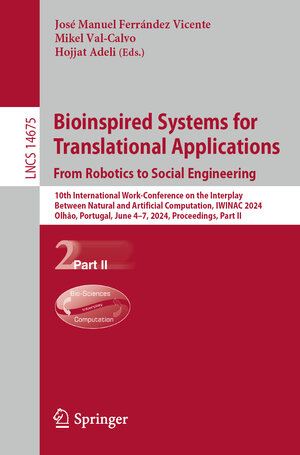
Bioinspired Systems for Translational Applications: From Robotics to Social Engineering
10th International Work-Conference on the Interplay Between Natural and Artificial Computation, IWINAC 2024, Olhâo, Portugal, June 4–June 7, 2024, Proceedings, Part II
herausgegeben von José Manuel Ferrández Vicente, Mikel Val-Calvo und Hojjat AdeliThe two volume set LNCS 14674 and 14675 constitutes the proceedings of the 10th International Work-Conference on the Interplay Between Natural and Artificial Computation, IWINAC 2024, which took place in Olhâo, Portugal, during June 4–7, 2024.
The 99 full papers presented in these proceedings were carefully reviewed and selected from 193 submissions. They were organized in topical sections as follows:
Part I: Machine learning in neuroscience; artificial intelligence in neurophysiology; neuromotor and cognitive disorders; intelligent systems for assessment, treatment, and assistance in early stages of Alzheimer's disease and other dementias; socio-cognitive, affective and physiological computing; affective computing and context awareness in ambientintelliigence; learning tools to lecture;
Part II: Machine learning in computer vision and robotics; bio-inspired computing approaches; social and civil engineering through human AI translations; smart renewable energies: advancing AI algorithms in the renewable energy industry; bioinspired applications.



